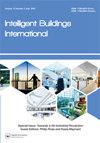Editorial
IF 1.7
Q2 CONSTRUCTION & BUILDING TECHNOLOGY
引用次数: 0
Abstract
This journal like others seeks to advance knowledge and understanding in all the interconnected areas that focus on intelligent buildings and their role in the planning of intelligent cities. But how far can we go in reaping new knowledge? Will we ever have a complete template of knowledge? Einstein set out to discover a unified field theory which would explain how the universe worked but today at astronomical or atomic scales this still eludes us. The more we discover the more questions appear. There seems to be an asymptotic state of knowledge with no finite end in sight. In 1931, an Austrian mathematician Kurt Gődel proposed his incompleteness theorem in which he demonstrated that with any mathematical system there will always be true statements which cannot be proved. To all those mathematicians that, like Einstein had in physics, sought to develop a complete mathematical system this was devastating news. So yes perfect unified systems of knowledge are beyond us but the discovery of those steps in the process such as the discovery of new particles in the atom or nearer home seeking to understand the role of artificial intelligence in developing intelligent buildings for example, these evolutionary steps remain challenging and exciting. The origins of chess began in India some 1500 years ago and have been mentioned by the United Nations as a game like others that can improve mental health by letting the player enter a mental flow state of complete immersion and absorption. Chess requires logic and reasoning and these can stimulate mental agility which may lead on to a more creative deliberation about alternative solutions. I wonder if more offices, hospitals and schools should make chess sets easily available to encourage mental wellbeing. The downside may be people become too absorbed and reluctant to leave the game and this would not be favoured by office managers but a ‘chesslunch’ might offset that energy low point in the early afternoon. The need to understand creativity in a deeper way is crucial and is as important as the much-used word productivity so why not let us explore all the possibilities to make this happen. A recent study from the Paris Brain Institute (ICM) explains why daylong cognitive work drains one’s energy and can affect decision-making (see article by A. Wiehler et al., in Current Biology 2022, 32(16), 3564–75). Does concentration, memorising, multi-tasking and problem-solving cause the brain to tire and hence decrease its efficacy in making decisions? They describe how nerve cells in the brain break down nutrients to release energy to think but during this process, toxic by-products are accumulated called metabolites and one of these that proliferate is glutamate. Incidentally one function of sleep is to clear these toxins. During the day, this build-up of toxins occurs in the lateral prefrontal cortex area of the brain but is particularly prevalent in subjects that are employed in high-demand jobs. Should we rearrange the working day? For example, air traffic controllers work for 2 hours then break for 30 minutes but should we consider this work pattern for other jobs requiring sustained concentration like doctors, nurses and others? In general, this highlights the importance of mental wellbeing a topic which has been neglected for far too long. A recent study from the US is reported in the October 2022 issue of the Journal of the Building and the Environment entitled Impact of WELL Certification on Occupant Satisfaction and Perceived Health, WellBeing, and Productivity: A Multi-Office Pre-Versus Post-Occupancy Evaluation and concluded that occupants in WELL certified office spaces reported improved satisfaction, productivity, health and productivity (see Nasim Ildiri et al., Building and Environment, Volume 224, October 2022). No doubt replica studies will follow in other countries. This research study might spike interest in other laboratories such as the impressive PEARL – Person-Environment-Activity Research Laboratory – which is part of University College London which I visited recently. Other topics worth a read and consideration are:编辑
与其他期刊一样,本期刊旨在促进对智能建筑及其在智能城市规划中的作用的所有相互关联领域的知识和理解。但是我们在获取新知识方面能走多远呢?我们会有一个完整的知识模板吗?爱因斯坦开始发现一个统一的场论,可以解释宇宙是如何运作的,但今天在天文或原子尺度上,这仍然是我们无法做到的。我们发现的越多,问题就越多。似乎有一种知识的渐近状态,看不到有限的终点。1931年,奥地利数学家库尔特Gődel提出了他的不完备性定理,在这个定理中,他证明了在任何数学系统中总会有不能被证明的真命题。对于所有像爱因斯坦那样致力于物理学的数学家来说,这是一个毁灭性的消息。所以,是的,完美统一的知识系统超出了我们的能力范围,但是在这个过程中发现这些步骤,比如发现原子中的新粒子,或者更接近我们的家园,试图理解人工智能在开发智能建筑中的作用,这些进化的步骤仍然具有挑战性和令人兴奋。国际象棋起源于大约1500年前的印度,联合国曾提到,国际象棋与其他游戏一样,可以通过让玩家进入完全沉浸和专注的精神流状态来改善心理健康。国际象棋需要逻辑和推理能力,这可以激发思维敏捷性,这可能会导致对替代解决方案的更具创造性的考虑。我在想,更多的办公室、医院和学校是否应该提供方便的象棋,以鼓励心理健康。不利的一面是,人们可能会变得过于专注,不愿离开游戏,这可能不受办公室经理的欢迎,但“国际象棋午餐”可能会抵消下午早些时候的能量低谷。更深入地理解创造力的需要是至关重要的,它与经常使用的“生产力”这个词一样重要,所以为什么不让我们探索所有的可能性来实现这一目标呢?巴黎大脑研究所(ICM)最近的一项研究解释了为什么一整天的认知工作消耗人的精力,并可能影响决策(见A. Wiehler等人的文章,《当代生物学》2022,32(16),3564-75)。集中注意力、记忆、多任务处理和解决问题是否会导致大脑疲劳,从而降低其决策效率?他们描述了大脑中的神经细胞如何分解营养物质以释放能量来思考,但在这个过程中,有毒的副产物被称为代谢物,其中一种增殖的是谷氨酸。顺便说一句,睡眠的一个功能就是清除这些毒素。在白天,这种毒素的积累发生在大脑的外侧前额皮质区域,但在高要求工作的受试者中尤其普遍。我们要重新安排工作时间吗?例如,空中交通管制员工作2小时,然后休息30分钟,但我们是否应该将这种工作模式应用于其他需要持续专注的工作,如医生、护士等?总的来说,这突出了心理健康的重要性,这是一个被忽视了太久的话题。美国最近的一项研究发表在2022年10月的《建筑与环境杂志》上,题为《WELL认证对居住者满意度和感知健康、福祉和生产力的影响:多办公室入住前与入住后评估》,并得出结论,获得WELL认证的办公空间的居住者报告满意度、生产力、健康和生产力有所提高(见Nasim Ildiri等人,建筑与环境,第224卷,2022年10月)。毫无疑问,其他国家也会进行类似的研究。这项研究可能会激发人们对其他实验室的兴趣,比如令人印象深刻的PEARL——人-环境-活动研究实验室——这是我最近访问的伦敦大学学院的一部分。其他值得阅读和考虑的主题有:
本文章由计算机程序翻译,如有差异,请以英文原文为准。
求助全文
约1分钟内获得全文
求助全文
来源期刊

Intelligent Buildings International
CONSTRUCTION & BUILDING TECHNOLOGY-
CiteScore
4.60
自引率
4.30%
发文量
8
 求助内容:
求助内容: 应助结果提醒方式:
应助结果提醒方式:


